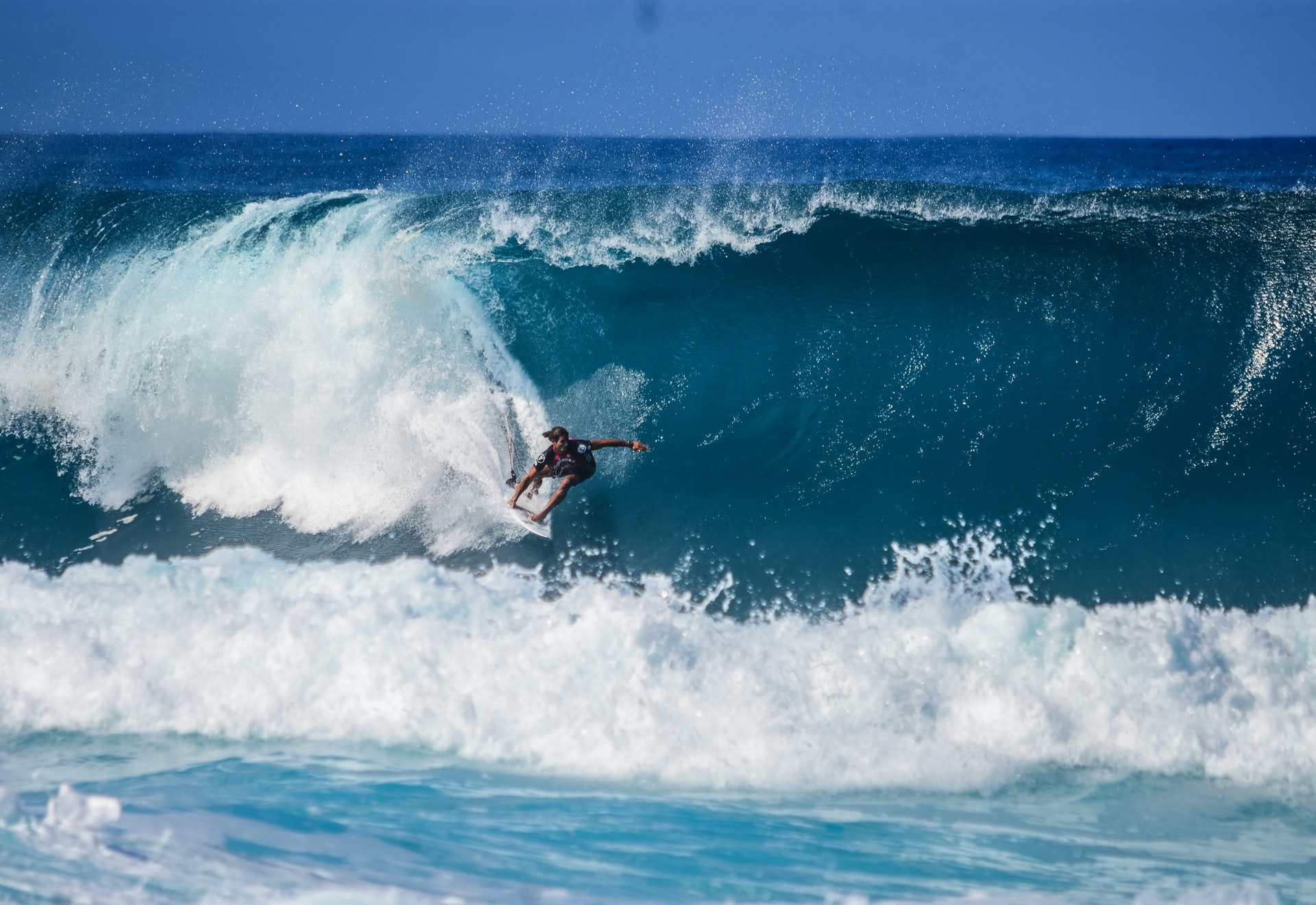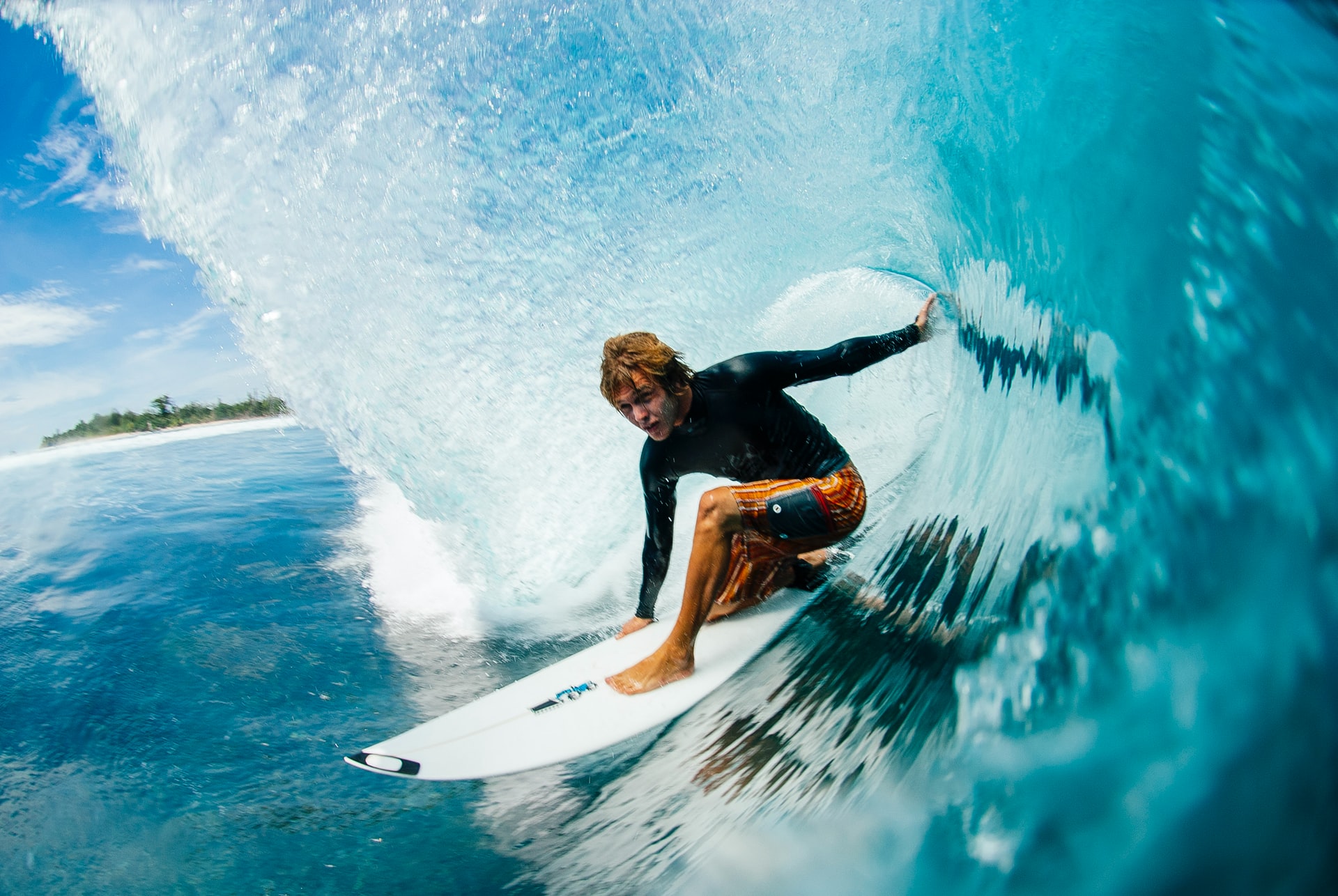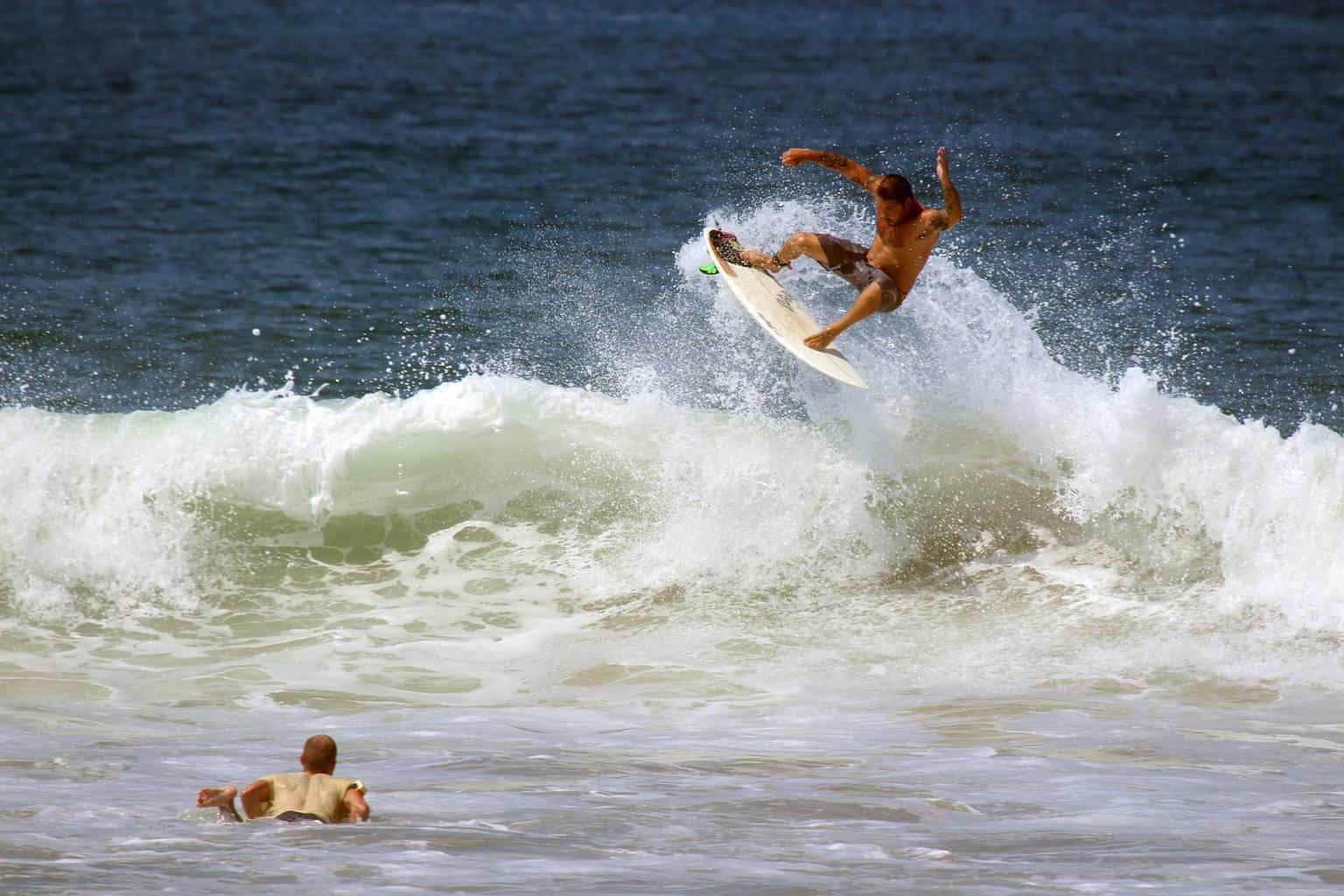We have all heard of the term vertigo.
Imagine your world starting to spin, feeling unbalanced, and not quite being able to tell which way is up or down.
The thought of experiencing vertigo is not a pleasant one, especially while surfing.
This brings up the question: can surfing cause vertigo?
Strictly speaking, surfing cannot cause vertigo as it is an internal problem.
However, it is possible to experience vertigo while surfing.
Furthermore, surfing can stimulate a vertigo problem if it pre-exists.
This article will look further into the relationship between surfing and vertigo, how it may occur, and what to do if it does.
- What Is Vertigo
- How Can Surfing Cause Vertigo?
- How Can I Stop Vertigo?
- What To Do if You Experience Vertigo While Surfing
- How To Avoid Vertigo While Surfing (3 Simple Tips)
- Conclusion
- You Might Also Like…
Disclosure: this post contains affiliate links (clearly marked with ), which means we may earn a commission if you buy something through them, at no additional cost to you.
What Is Vertigo
In the simplest way, vertigo is the sense that your surroundings are spinning or moving due to dizziness.
This results in you feeling unsteady, off-balance, and as if the world has turned on its side.
Vertigo is closely related to the feeling of motion sickness.
However, is not the same as being lightheaded.
What are the Symptoms of Vertigo?
The symptoms of vertigo slightly differ from person to person and may include some, but not necessarily all, of the following:
- The sensation of spinning
- Tilting of the head or body
- Swaying from foot to foot
- An unsteady or unbalanced feeling
- Being pulled in one direction or the feeling of the head being heavier on one side
Due to the nature of these symptoms, the following may be experienced in conjunction with the above:
- The feeling of nausea
- Vomiting due to dizziness
- Jerking eye movements or unfocused looks
- Headaches or migraines
- Sweating or hot flushes
- Ringing in the ears or hearing loss (tinnitus)
What are the Causes of Vertigo?
There are three main causes of vertigo:
BPPV, Meniere’s disease, and Vestibular neuritis or Labyrinthitis.
1. BPPV: Benign paroxysmal positional vertigo occurs when tiny calcium particles clump in the inner ear canal.
As the inner ear sends signals to the brain about body movements due to gravity, these signals become distorted.
2. Meniere’s disease: This is an inner ear disorder, commonly caused by fluid buildup and changing pressure in the ear.
3. Vestibular neuritis and Labyrinthitis: An inner ear problem usually related to infection and inflammation in the inner ear.
Some other causes of vertigo could also include
- Head and neck injuries
- Brain damage
- Some medications
- Migraine headaches
Although all of the above causes could be triggered while surfing, it is BPPV that is most likely, as it is most commonly caused by sudden changes in the position of the head.
It is because of this that it will be the focus of how surfing can cause vertigo in the remainder of this article.
Can Vertigo Affect Your Balance While Surfing?
Yes, vertigo will definitely affect your balance.
Because vertigo is the sense that the world has turned sideways, this leads to confusion in the brain, dizziness and therefore a loss of balance.
Think about it in the way that if you do not know which side is up, then how can you stand up?
How Can Surfing Cause Vertigo?
As mentioned early on, surfing is not a cause of vertigo.
Vertigo is caused by an underlying medical condition.
However, surfing can trigger vertigo or similar situations such as dizziness and disorientation.
The most common way that vertigo is triggered while surfing is when wiping out.
If you have already started surfing, you will know all too well the feeling of being tumbled by a wave.
The ocean is harsh and powerful, and it is common to feel like you are sometimes stuck inside a washing machine after falling off of your board.
The constant rolling under the water is very likely to leave you disorientated, not knowing which way is up or down.
It is also common to pop your head up in this situation not knowing what direction you are facing or where the shore is.
Adding vertigo or being light-headed to this situation can make surfing all the more dangerous, and even a little scary.
Of course, if you have a history of vertigo, it can be triggered with as little as a quick cutback or bottom turn, which will likely result in you falling off your board, or colliding with another surfer.
Can Surfer’s Ear Cause Vertigo?
Surfer’s ear is a condition that occurs only when you are exposed to cold water and wind.
When your ears are exposed to these conditions, they can start to form an extra bone inside of the ear canal to protect it.
This is not a dangerous growth, however, it could eventually lead to deafness in that ear.
One major problem with surfer’s ear is that if the canal closes too much, it could trap water inside, thus leading to infection.
Although surfer’s ear on its own is unlikely to lead to vertigo, trapped water in the ear canal or an infection can both cause a loss of balance, dizziness and sometimes vertigo.
Why am I Suddenly Getting Vertigo While Surfing?
If you have been surfing for years (or months) and have never experienced vertigo before, but suddenly it seems to be a problem, then it is likely one of two things.
As mentioned before, inner ear infections are a common cause of vertigo.
If you have an ear infection, the sloshing of water in and out of the ear canal could make the infection worse, and lead to more balance problems.
It is a good idea to pay attention to your ears if you are suddenly experiencing vertigo while surfing.
The second reason this may be occurring is that the difference in temperature between your two ears can lead to vertigo.
If you are surfing with a single earplug in due to an infection or surfer’s ear, the cold water on your exposed ear in comparison to your warmer, closed off ear could cause an imbalance between the two.
How Can I Stop Vertigo?
According the the NHS, if you experience vertigo, or have a high chance of experiencing vertigo, you should do the following:
- Lie still in a quiet, dark room, which will reduce spinning
- Move your head slowly during your daily activities
- Sit down if you start to feel dizzy
- Stand up slowly
- Try to relax, as anxiety can make vertigo worse
Although these tips are helpful, they do not all apply to being in the water.
For example, you do not have the privilege of lying down and closing your eyes, nor will you be standing up slowly while surfing.
What To Do if You Experience Vertigo While Surfing
If you happen to experience vertigo, a dizzy spell, or any sort of disorientation while surfing, it can be quite a scary situation.
Knowing what to do if this happens will help you quickly get through it and back to your favorite past time (or back to the shore).
1. Ask for Help
Never let your pride or ego get in the way.
Although surfers sometimes come across as cold, territorial, or aggro, if you ask for help, no one will refuse.
If you are sitting on your board or paddling out past the break and begin to feel dizzy, immediately let someone around you know.
This way they can make sure you are stable and give you a warning if there is an oncoming set or surfer.
2. Don’t Panic
Staying calm is always the secret in stressful and scary situations.
When you stay calm, your body relaxes and your senses heighten.
Vertigo never lasts long and in most cases will subside within a minute.
The best thing you can do is to hold onto your board and wait for it to pass.
Panicking increases the level of cortisol in our bodies (stress hormone), which could lead to other risks such as hyperventilation and blackouts.
3. Use Gravity
One of the most likely and dangerous occasions that you may feel vertigo when surfing is while being tossed and turned in the washing machine that is a wave.
Finding yourself under the wave with no idea which way is up is terrifying and potentially dangerous as you do not know which way to swim for air.
Luckily, there are three important things that will aid you in getting past this problem-free:
Follow your leash
One of the magical things about a surfboard is that it floats. If it didn’t, then surfing would not be a thing in the first place.
If you are not sure which way is up when under the water, reach for your ankle that is attached to your leash and follow the leash to the surface.
Your surfboard will always be facing up, even if it is completely submerged.
Watch your bubbles
A great way to get over vertigo while under the water is to watch your bubbles.
As you most likely know, air bubbles will always travel towards the surface.
Having a visual reference for which way is up will help relieve you of the feeling of vertigo.
Scuba divers are taught this same technique as a means to orientate themselves.
Relax and wait
If you have been wiped out by a wave, you will most likely have taken a lungful of air before hitting the water.
Just like bubbles in the water, the air in your lungs forms an internal “bubble” which is more buoyant than water.
If you relax, let the wave do with you what it wants (because it is going to anyway) and then let it pass over you, you will slowly float to the surface.
Keep in mind that if you find yourself underwater with no air in your lungs at all, this might not be the safest option.
Firstly because you will most likely be dying for a breath of fresh oxygen, and secondly, if you have low body fat and high muscle mass, there is a chance that you will sink and not float.
How To Avoid Vertigo While Surfing (3 Simple Tips)
You may have a good idea about what to do if you experience vertigo while surfing, but it is well known and said all the time that prevention is better than a cure.
So how can you avoid experiencing vertigo while surfing?
1. Use Earplugs
Because we use our ears for balance, the sloshing of water in and out of them can stimulate vertigo in someone that has a history with the experience.
Using surfing earplugs can help cut this out of the equation.
One thing to keep in mind, however, is that not being able to hear what is going on around you can be dangerous.
This is the same when listening to music with earphones while surfing.
2. Know Your Medication
As mentioned before, some medications can be the cause of vertigo.
If you are on medication, it is important to know what the side effects may be.
Some of these drug categories are listed below.
Bear in mind, however, that the side effect of vertigo is not limited to this list, and on the flip side, taking these medications does not guarantee vertigo.
- Antidepressants
- Anti-diabetics
- Anti-inflammatory
- Cardiovascular drugs
- Sedatives
- Tranquilisers
- Anti-hypertensive agents
3. Keep an Eye on the Horizon
Because vertigo is similar to motion sickness or seasickness, watching the horizon can help reduce its chances.
Because the horizon always appears to be flat, it will aid in creating the illusion that your body is still, even while bobbing up and down in the swell.
Conclusion
Experiencing vertigo while surfing can be both scary and dangerous.
Therefore, it is always best to take the necessary steps to avoid putting yourself in that situation.
Surfing does not directly cause vertigo.
However, the movements both on top of the water, as well as below the surface of the ocean, can stimulate a vertigo problem that already exists.
Vertigo never lasts long, but being unaware of your surroundings for as long as a minute while surfing can be a problem.
For this reason, you should never be afraid to ask for help or to help others when you notice something is wrong.
You Might Also Like…
-

Do Surfers Ride Switchfoot? 5 Benefits (& Why You Should Learn It)
-

Do Surfers Shave Their Legs? 5 Common Reasons (+Pros & Cons)
-

Do Surfers Wear Helmets? 8 Situations You Should Wear One (+4 Cons)
-

Do Surfers Poop in the Ocean? Myths & Facts (+5 Tips)
-

Do Surfers Run Into Each Other? 5 Common Reasons (+8 Tips)
-

Do Surfers Have Beards? Pros & Cons You Should Know (+4 Tips)
-

Do Surfers Like Constructive or Destructive Waves? (+Pros & Cons)
-

How to Surf Safely: 34 Crucial Tips (Every Surfer Should Know)
-

Do Pro Surfers Use Leashes? (+6 Reasons Why You Should Too)
-

Do Many Surfers Drown? Here Are the Facts (+4 Common Reasons)
-

Do Surfers Wear Life Jackets? (7 Reasons Why They Don’t)
-

Do Surfers Like Rip Currents? (& How to Use Them Safely)








